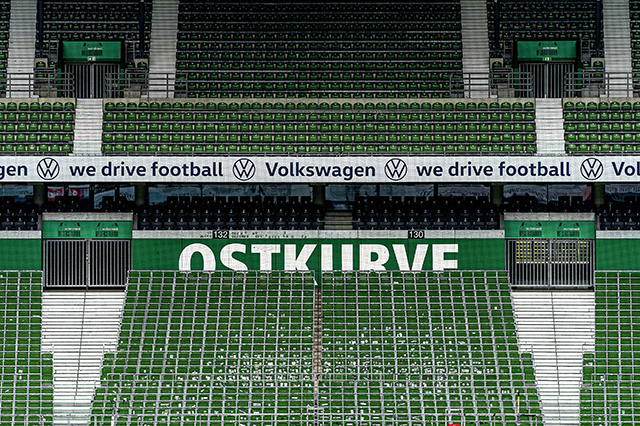- Local News
- Tue-2020-05-19 | 02:47 pm

Germany's top-flight became the first top European league to resume after a two-month hiatus, in empty stadiums and surrounded by draconian hygiene measures.
Despite the restrictions, the weekend's matches passed off without problems.
Players and staff were regularly tested for COVID-19 in the weeks before the resumption, while the small number of officials and journalists permitted to attend matches had their temperatures checked before being allowed in.
Police fears that fans would gather outside the grounds did not materialise.
"There was a big sense of relief," the CEO of the international arm of the Bundesliga, Robert Klein, told AFP and other media Monday.
"We want to finish the season, but are aware there is a big responsibility that we do this correctly.
"There was an enthusiasm to see top-flight football again.
"Someone said to me, 'it looks like the eyes of the world are on the Bundesliga' and I think that was true.
"We were trending in Colombia, Ghana, South Africa and Asia."
'Rollercoaster'
Borussia Dortmund's Norwegian striker Erling Braut Haaland showed he had lost nothing of his power during the months of inaction as he scored the first goal of Saturday's restart in the 4-0 hammering of rivals Schalke.
Pay-per-view broadcaster Sky reported a record audience of six million viewers in Germany for Saturday's matches, after making some available for free. The overall global figure is expected later this week.
With fans across the world currently starved of live football due to the pandemic, the viewing figures recorded for the Dortmund v Schalke match in Mexico, Brazil, Italy and Argentina were far higher than normal.
In the UK, broadcaster BT Sports had a peak figure of 652,000 for that same match — a respectable figure when compared with the channel's best-ever Premier League audience of 1.7 million for a Liverpool v Arsenal match in December 2018.
Klein described the last few weeks as "exhilarating, challenging... a rollercoaster" as the league got its highly detailed restart plans approved by the German government.
There were, however, a few glitches on Saturday.
Markus Soeder, the leader of the state of Bavaria, criticised Hertha Berlin's players for hugging to celebrate goals in their 3-0 win at Hoffenheim.
Players also embraced and shook hands in some other matches, breaching hygiene guidelines which the clubs have agreed to.
The German Football League say those concerned will not be sanctioned, but Klein said the message will be reinforced.
"In the hygiene concept, there is a guideline to celebrate within the social distancing norms," Klein said.
"One can imagine" he added, that in the heat of the moment, for example "a goal being scored, that maybe sometimes they will get closer.
"I think the guidelines were generally well respected at the weekend.
"They are there for the clubs to implement. I am speaking to the clubs day in, day out to remind them of what needs to be done so we have the right to go to a second or third matchday."
Following league leaders Bayern Munich's 2-0 win at Union Berlin on Sunday, Thomas Mueller reminded his fellow pros of their duty as role models: "I think we are now more strictly under observation than the rest of Germany."
'Happy to share'
The sight of elbow-bump celebrations, substitutes wearing face masks on the bench and hearing players' calls echoing around empty terraces will take some getting used to.
"I think it will be the new normal for a while, until the end of the season it will be without fans and it's possible that will go into next season," said Klein.
"Until COVID is seriously under control — and that will probably only be when a vaccine comes — it will continue to be the case."
The Dutch league, which already curtailed its 2019-2020 season, wants to follow the Bundesliga's restart blueprint for next season.
The head of the Spanish league has also described Germany as "an example to follow" and Klein says the Bundesliga is happy to help other professional leagues.
"We're happy to share not only the medical protocol, but also the wider work in being able to get the support of local authorities and government to implement it," said Klein.
"It's a holistic approach which is required and without all parties coming to the table, it's not possible








